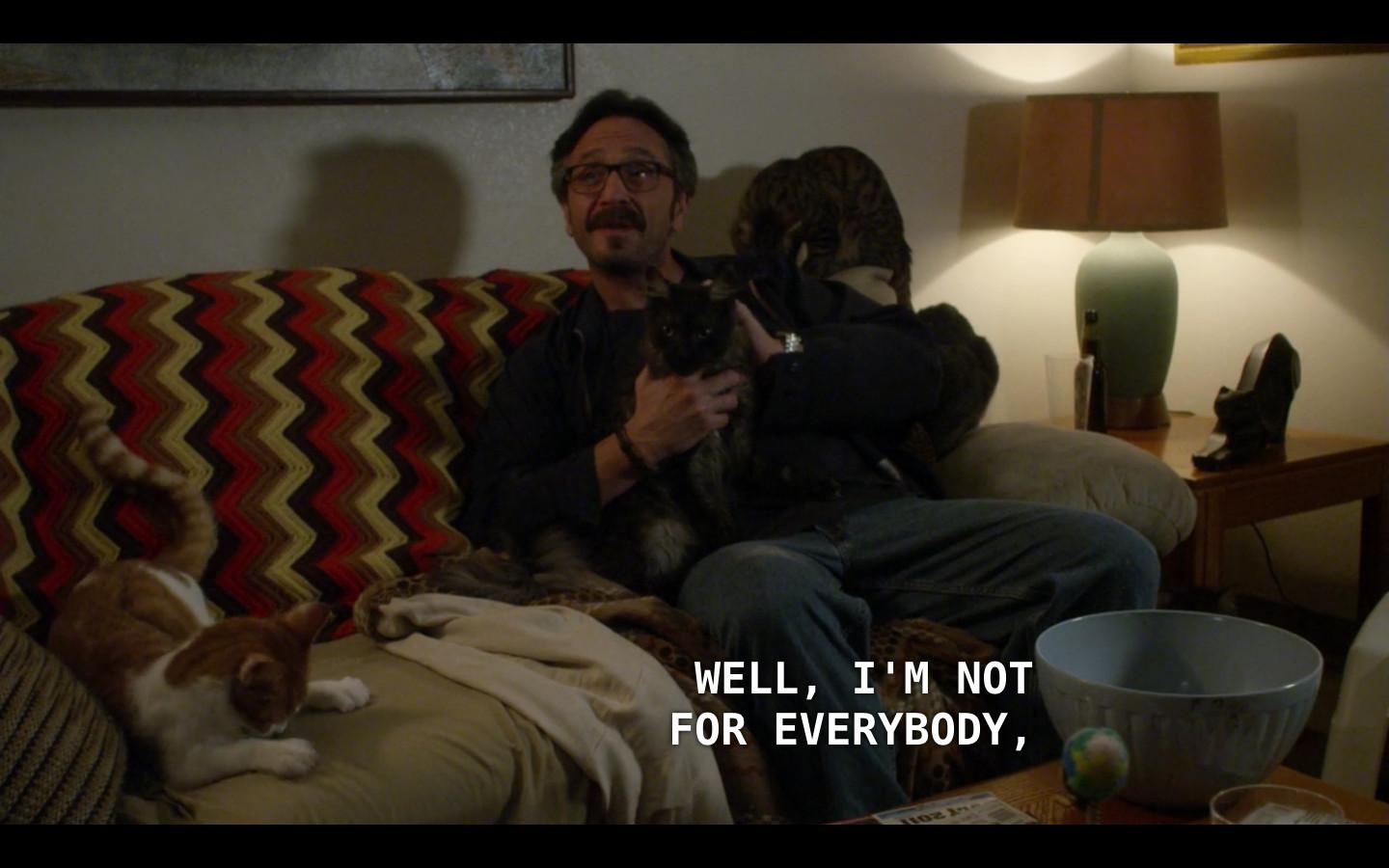Marc Maron was put on this earth, grudgingly, to say my ex-wife. He is the Richard Pryor, the Picasso, the Muhammad Ali of speaking those words. His voice is a warm, downtrodden, benignly neurotic instrument, a nicotine-stained aural carpet of regret and resignation. It’s the perfect weapon for a semi-successful stand-up comedian, a wildly successful podcaster, and now, perhaps, a transcendent character actor, provided his character gets to deliver lines like, “I have a flaw in my conflict style, according to my ex-wife’s cognitive-behavioral therapist.”
GLOW, the zany and prickly-cuddly new Netflix comedy about an ’80s female pro-wrestling troupe, is perfect for him, and he is perfect for it. As the slimy B-movie auteur and troupe leader Sam Sylvia, Maron is very explicitly channeling Tom Hanks in A League of Their Own: the grizzled burnout getting One More Chance, contemptuously coaching a ragtag bunch of disgusted women with a sleazy benevolence. “OK, I said I’d do anything, so here we fuckin’ are,” are his first words in the pilot. “Hello, ladies.”
That’s right: It’s another harmless jackass with a heart of gold, except instead of howling PG-13 catchphrases like “There’s no crying in baseball,” this one doles out advice like, “Try not giving a fuck: There’s a lot of power in that.” And there is. It turns out that he sounds pretty convincing saying the words fuck salads, too.
In the late ’90s, Maron was just another workmanlike stand-up who seemed to live beneath the desks of David Letterman and especially Conan O’Brien. Revisit old YouTube clips now and your first reaction is to induct him into the Looks Really Weird as a Younger Person Hall of Fame, right alongside Willie Nelson and Letterman himself. The second reaction is that this guy is pretty funny. “I know we’re at war — I flipped around, I found it on two channels,” he deadpans to a giddy 1999 Letterman audience that sells the joke for him. “I don’t think we should live in a time where you can go [mimes TV remote], Oooh, ethnic cleansing. [Mimes changing channel] Hey! Wrestling! I think it’s wrong.”
But to unlock his full potential, Maron needed a woeful-underdog narrative, triggered less by his relatively minor failures (two marriages, plus a rocky stint at doomed left-wing radio network Air America) than by his frenemies’ outsized successes. His old friend Louis C.K. got extremely famous: the sold-out tours, the groundbreaking prestige-TV show, the Rolling Stone cover. Meanwhile, Maron retreated to his garage in L.A. and emerged with WTF With Marc Maron, one of the first podcasts to suggest that podcasting could be a career.
The best WTF entries are truly spectacular: A few years back, Slate crowned a two-part 2010 summit between Maron and Louis C.K. as the single-greatest podcast episode ever, by turns combative (“So are we alright, me and you?” is Maron’s first question) and tear-jerking (Louis’s voice breaks as he recounts the troubled birth of his daughter). For nearly two hours, they’re an unbeatable team: It’s Louis’s job to, for example, tell a profoundly filthy story about buying a trumpet and immediately befouling it in a Times Square porno theater, and it’s Maron’s job to expertly egg on Louis by literally saying just the word yeah 25 separate times in 90 seconds. Please listen to this, in private.
WTF is a very dudely enterprise, a glittering palace of male anxiety that might strike female listeners — and especially female guests — quite differently. The other knock on the pod after 800-plus installments is that Maron is rarely content to merely be the yeah guy. His research is spotty, and he treats his guests like his personal therapists: He is of the I’ll talk about myself to goad you into talking about yourself school, which is lovely when it works (ask Mark Mothersbaugh) and maddening when it doesn’t (ask Sofia Coppola). But the show relaunched his career: In 2013, he debuted Maron, a half-hour IFC comedy series with very explicit Louie overtones — the meta Maron-as-himself conceit and cringe-humor theatrics — that ran for four seasons and came to a respectable close last summer.

The show took some risks, flaunted some ambitions. Its fourth and last season took a grim, darkest-timeline approach to Maron’s real-life struggles with substance misuse, with a fictional relapse that leaves his character destitute and living in a storage unit. (In real life, last year he celebrated 17 years of sobriety.) But Maron was never going to transcend its obvious inspiration. GLOW is not liable to win him an Emmy either, but in his shaggy, exasperated way, he is for the first time truly Acting. Partly he’s an object of easy humiliation, pratfalling his way into and out of the wrestling ring, and accidentally giving one of his wrestlers a copy of his video-dating profile. (“Choose me: I’m lonely, and my cock works great” is the laugh line, though the beauty is in the way he stipulates that his dream girl should be “under 30.”)
But the show’s best, tenderest, and most quietly charged moments tend to involve him butting heads with one of his wrestlers, forming impromptu tag teams that conjure up that old therapist-patient dynamic and require the combatants to switch roles every few seconds. He shows up at the door of former soap-opera queen and devastated new mother Debbie Eagan (Betty Gilpin) with a sales pitch to make her the wrestling troupe’s star attraction, and his methods are at once crude (“You’re pretty — you’ve got big boobs”) and surprisingly astute. (He adroitly calls out the sexism that got her bounced from the soap-opera business in the first place.)
He’s great with series star Alison Brie, too, who plays the try-hard failing actor and budding wrestling heel Ruth Wilder. Ruth did a terrible thing and doesn’t quite know why, so Maron sweetly offers something of himself: “For me, it’s usually because I’m high, or drunk, or someone has done something to make me feel so small and so insecure that I have to do something to remind myself that I exist.” Well, OK, it’s his character who does that, but you suspect it’s really him, and you always have. That is the curse of Marc Maron, here transformed into more of a blessing than ever.
